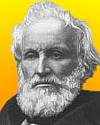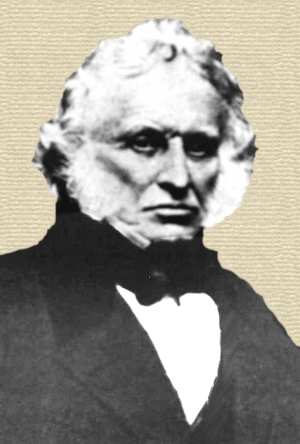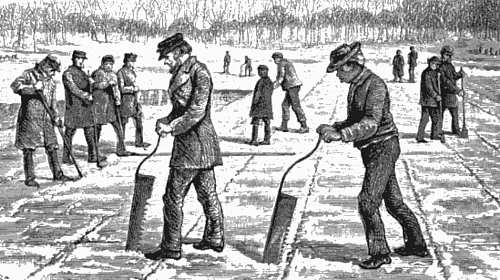 (source)
(source)
|
Frederic Tudor
(4 Sep 1783 - 6 Feb 1864)
American businessman known as the "Ice King" for inventing an export trade in block ice cut from New England ponds frozen in winter, and delivered to countries with hot climates before the there were electric refrigerators.
|
Frederick Tudor, Ice Exporter
from Captains of Industry (1884).
[p.156] Edward Everett used to relate a curious anecdote of the time when he was the American minister at London. He was introduced one day to an Eastern prince, who greeted him with a degree of enthusiasm that was altogether unusual and unexpected. The prince launched into eulogium of the United States, and expressed a particular gratitude for the great benefit conferred upon the East Indies by Mr. Everett’s native Massachusetts. The American minister, who was a good deal puzzled by this effusion, ventured at length to ask the prince what special benefit Massachusetts had conferred upon the East Indies, wondering whether it was the missionaries, or the common school system, or Daniel Webster’s Bunker Hill oration.
“I refer,” said the prince, “to the great quantity of excellent ice which comes to us from Boston.”
Mr. Everett bowed with his usual politeness, but was much amused at the excessive gratitude of the prince for the service named.
[p.157] The founder of this foreign ice business, which has now attained such large proportions, was a Boston merchant named Frederick Tudor, son of that Colonel William Tudor who studied law under John Adams, and who served his country on the staff of General Washington, and afterwards became a judge. Frederick Tudor, who was born in 1783, the year of the peace between England and the United States, entered early into business, being at twenty-two already owner of a vessel trading with the West Indies.
It was in 1805 that the idea of exporting ice first occurred to him—an idea which, as he was accustomed to relate in his old age, was received with derision by the whole town as a “mad project.” He had made his calculations too carefully, however, to be disturbed by a little ridicule; and that same year he sent out his first cargo of a hundred and thirty tons, to the Island of Martinique.
The result justified his confidence. The ice arrived in perfect condition, and he was encouraged to follow up his single cargo with many others larger and more profitable. During the war of 1812 business was somewhat interrupted by the English cruisers, which were ever on the alert for prizes in the West Indian waters, but, after peace was declared, his trade increased rapidly. He supplied ice to Charleston and New Orleans also, those cities at first requiring but a ship-load each per annum, although the demand increased so [p.158] rapidly that a few years later New Orleans alone consumed thirty cargoes.
Almost from the first, Mr. Tudor had believed that ice could be transported as safely and profitably to Calcutta as to Havana; but he could not bring others to share this opinion — at least, not to the point of risking money upon it. It was not, therefore, until 1834, twenty-nine years later than his Martinique experiment, that he sent his first cargo of one hundred and eighty tons of ice to India. Notwithstanding a waste of one third of the whole cargo during the voyage, he was able to sell this Massachusetts ice at one half the price charged for the artificially frozen ice formerly used in Calcutta by the few families who could afford such a luxury.
The cold commodity which he provided met, therefore, with a warm welcome from the English inhabitants. They recognized the boon afforded them, and expressed their gratitude by raising a subscription and presenting to the enterprising Yankee merchant a fire-proof building in which to store his ice. He met them in the same spirit of wise liberality, and sold the article at no more than a reasonable profit—about three cents a pound—which enabled the great body of English residents to use the ice habitually. Mr. Tudor used to boast that in Jamaica he sold the best Wenham ice at half the price which an inferior article brought in London; and even at Calcutta he made ice cheaper [p.159] than it was in London or Paris. On the passage to the East Indies, ice is four or five months at sea, traverses sixteen thousand miles of salt water, and crosses the equator twice; and on its arrival it is stored in massive double-walled houses, which are covered by four or five separate roofs. It has also to be unloaded in a temperature of ninety to one hundred degrees. Notwithstanding all this, the inhabitants of the most distant tropical seaports are supplied with ice every day of the year at the moderate price mentioned above.
It was Frederick Tudor also who originated and developed the best methods of cutting, packing, storing, and discharging ice, so as to reduce the waste to the minimum. I am assured by a gentleman engaged in the business that the blocks of ice now reach Calcutta, after the long voyage from Boston, with a waste scarcely noticeable. The vessels are loaded during the cold snaps of January, when water will freeze in the hold of a vessel, and when the entire ship is penetrated with the intensest cold. The glittering blocks of ice, two feet thick, at a temperature below zero, are brought in by railroad from the lakes, and are placed on board the ships with a rapidity which must be seen to be appreciated. The blocks are packed in sawdust, which is used very much as mortar is used in a stone wall. Between the topmost layer of ice and the deck there is sometimes a layer of closely packed hay, and sometimes one of barrels of apples. It has [p.160] occasionally happened that the profit upon the apples has paid the freight upon the ice, which usually amounts to about ten thousand dollars, or five dollars a ton.
The arrival of an ice ship at Calcutta is an exhilarating scene. Clouds of dusky natives come on board to buy the apples, which are in great request, and bring from ten to thirty cents each, according to the supply. Happy is the native who has capital enough to buy a whole barrel of the fruit. Off he trudges with it on his back to the place of sale, or else puts it on a little cart and peddles the apples about the streets. In a day or two that portion of the cargo has disappeared, and then the ice is to be unloaded. It was long before a native could be induced to handle the crystal blocks. Tradition reports that they ran away affrighted, thinking the ice was something bewitched and fraught with danger. But now they come on board in a long line, and each of them takes a huge block of ice upon his head and conveys it to the adjacent ice-house, moving with such rapidity that the blocks are exposed to the air only a few seconds. Once deposited there, the waste almost ceases again, and the ice which cost in Boston four dollars a ton is worth fifty dollars.
When Frederick Tudor had been employed twenty-five years in this trade, finding it inconvenient to be separated from the great body of merchants, he embarked again in general mercantile [p.161] business, by way of re-uniting himself to his former associates. The experiment resulted in ruinous losses. In less than three years he was a bankrupt, and owed his creditors two hundred and ten thousand dollars more than he could pay. The ice business being still profitable and growing, it was proposed to him that he should conduct it as the agent of his creditors, retaining a specified sum per annum for his personal expenses. To this he objected, and said to them:—
“Allow me to proceed, and I will work for you better than I can under any restriction. Give me the largest liberty, and I will pay the whole in time with interest.”
He was then fifty-two years of age, and he had undertaken to pay an indebtedness, the mere interest of which was about ten thousand dollars a year. By the time he had got fairly at work the treachery of an agent whom he had raised from poverty to wealth lost him his Havana monopoly, his principal source of profit. Then it became necessary to buy land bordering the lakes from which he gathered ice, and to erect in Calcutta, New Orleans, and elsewhere expensive and peculiarly constructed buildings for storage. Occasionally, too, he experienced the losses and adverse incidents from which no business is exempt. Nevertheless, in fourteen years from the date of his bankruptcy he had paid his debts, principal and interest, amounting to two hundred and eighty thousand dollars, besides having [p.162] acquired a large quantity of real estate, some of which had increased in value tenfold. Thus, while paying his debts, and in the very process of paying, and while thinking only of his creditors’ interest, he had gained for himself a very large fortune. He continued an ice merchant for more than fifty years; or, as he said himself:—
“I began this trade in the youthful hopes attendant on the age of twenty-two. I have followed it until I have a head with scarcely a hair that is not white.”
It was this enterprising merchant who may be said to have created the beautiful seaside retreat near Boston called Nahant, where he invented many ingenious expedients for protecting trees and shrubs from the east winds which lacerate that rock-bound coast. His gardens and plantations in Nahant were famous many years before his death. He died in 1864, aged eighty-one, leaving to his children and to his native State a name which was honorable when he inherited it, and the lustre of which his life increased.
- 4 Sep - short biography, births, deaths and events on date of Tudor's birth.
- Frederic Tudor: The Ice Trade Between America and India - from Mechanic's Magazine (1836).
- 13 Sep - short biography, births, deaths and events on date first shipment of ice arrived in Calcutta, India.
- The Frozen Water Trade, by Gavin Weightman. - book suggestion.
- The Ice King: Frederic Tudor and His Circle, by Carl Seaburg. - book suggestion.
- Booklist for Frederic Tudor.






